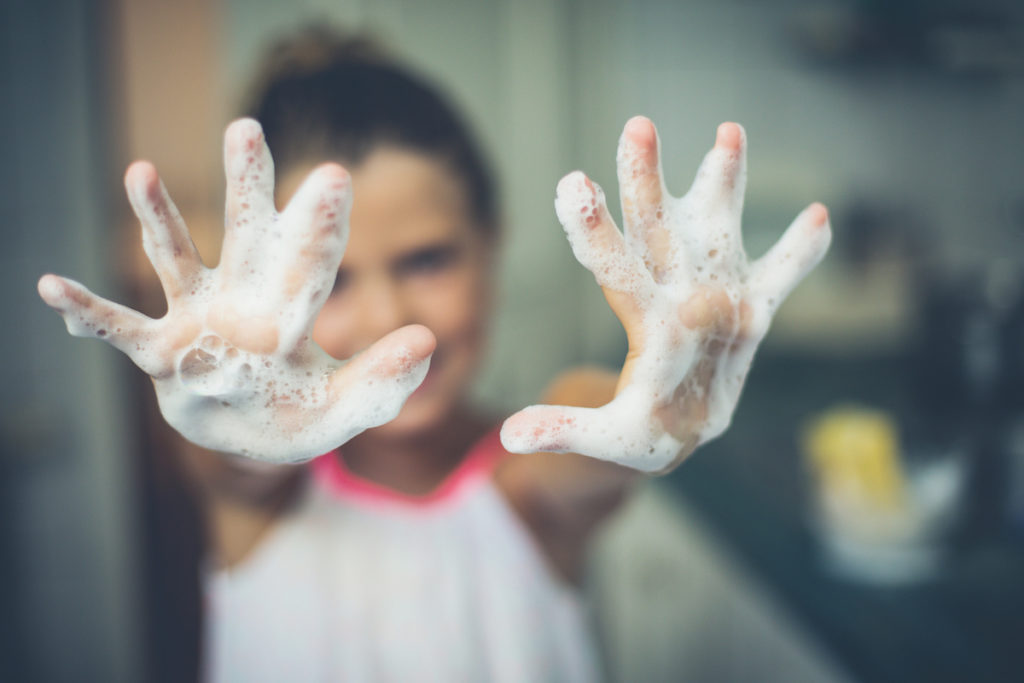洗手咁平常簡單嘅事,從未變得如此重要。呢個動作係我哋同COVID-19等冠狀病毒戰鬥嘅第一道防線。同口罩或者疫苗唔同,梘液係我哋大多數人都能負擔得起嘅東西。
一啲醫學界權威嘅機構,例如梅奧診所(Mayo Clinic),表示抗菌番梘同洗手液喺洗走COVID-19嚟講,唔一定比普通梘液更有效。疾病控制中心仲指出,酒精搓手液其實唔能夠有效對抗所有類型嘅細菌。從長遠嚟睇,普通梘液可能對我哋嘅健康更好。
梘液同水點樣打敗細菌
單獨使用水可以清除可見嘅污垢,但係病毒同細菌嘅微觀納米顆粒會卡喺我哋皺紋同指紋嘅縫隙中,呢個時候就要出動到洗手液喇。
所有洗手液(無論係液體,番梘定係泡沫洗水液),都係由“肥皂分子”組成。呢啲分子具有雙重性質:親水同疏水。當引入水中嘅時候,親水部分指向外部以同水結合,而疏水部分會避開水分,同油脂結合,將污垢同細菌捕獲喺稱為膠束嘅微小氣泡中。
COVID-19係一種冠狀病毒,意味住佢會被包裹喺油脂層中。想像一下,肥皂分子嘅拒水部分同佢嘅外層結合,拮穿入去,將病毒放氣。然後,肥皂將漏氣嘅病毒從皮膚中抽離,因此你可以將佢洗走。
用梘液同水獲得最佳結果
當你用洗手液起泡或者用番梘擦洗雙手至少20秒時,拒水部分會滲透到各種類型嘅病毒(包括冠狀病毒)中,而病毒通常有會有一層脂肪膜保護自己。
新西蘭政府嘅COVID-19網站建議使用特殊嘅洗手程序。包括擦洗手腕,手掌同手背,然後將手指交織喺一齊,用指尖搓手掌。令手嘅每個表面都起泡沫就係關鍵所在,泡沫會勾住病毒,然後可以將佢哋用水沖走。水嘅溫度唔太緊要,凍同暖都得。
好消息係,如果呢個方法,任何洗水液或者番梘都可以殺死冠狀病毒。但係如果你發現洗手後手變得乾澀者或過敏,請嘗試使用溫和嘅產品。用專門為敏感性皮膚而設計嘅無香料梘液。
用消毒搓手液同洗手液嘅危險
細菌與病毒完全唔同。標榜“抗菌”同 “消毒”嘅梘液,喺對抗COVID-19呢方面,佢哋其實冇比一般梘液優勝。消毒搓手液要喺酒精含量超過60%(對皮膚非常乾燥)嘅情況下先對病毒有效。而且,喺呢些藥劑中存活嘅任何細菌將來都可能進化到對抗菌產品產生抗藥性。
過量使用含有三氯生等成分嘅“抗菌”產品唔單止對身體具有潛在嘅危險,而且仲可以減少喺我哋皮膚同腸道中嘅益細菌。缺乏腸道菌群(又稱腸道微生物組)會引起好多其他疾病,包括糖尿病,關節炎,自身免疫性疾病以及過敏反應同敏感性增加。
Never before has humble hand washing emerged as such a hero. It’s our first line of defence in our battle against coronaviruses like COVID-19. And unlike masks, eye shields or vaccines, soap is something that’s accessible and affordable for most of us.
Respected public health information sources including the Mayo Clinic suggest that antibacterial soaps and hand washes are no more effective than regular soap alternatives at getting rid of COVID-19. The Center for Disease Control also states that alcohol-based hand sanitisers are not effective against all types of germs. And regular soap may be better for our health in the long-term.
HOW SOAP AND WATER BEAT THE BAD BUGS
Using water alone may get rid of visible dirt, but the microscopic nanoparticles of viruses and bacteria get stuck in the crevices of our wrinkles and fingerprints. Here’s where soap comes in.
All soaps – whether they’re liquid, bars, or foams – are made up ‘soap molecules’. These molecules have a dual nature: with both hydrophilic (water-loving) tails and hydrophobic (water-hating) heads. When introduced to water, the water-attracting parts point outward to bond with water, while the tails turn inwards to avoid the water, instead bonding with fats and oils, catching dirt and germs in microscopic bubbles called micelles.
COVID-19 is a coronavirus – meaning it’s encased in a protective fatty coating. Imagine a pin popping a balloon: the water-repelling end of the soap molecule bonds with this coating, stabbing it, and leaving the virus deflated. Soap then lifts the dead virus away from skin within its micelles, so you can wash it away.
HOW TO GET THE BEST RESULTS WITH SOAP AND WATER
When you lather and scrub hands well with soap for at least 20 seconds, the pin-shaped molecules will penetrate the types of viruses (including coronaviruses like COVID-19) that protect themselves with a fatty membrane.
The New Zealand Government’s COVID-19 website recommends a particular hand washing routine. It involves scrubbing wrists, palms and backs of hands, then interlacing the fingers, making fists around each thumb and rubbing fingertips into palms. Lathering every surface of the hands is the key to lifting them away from skin so they can be washed down the drain. The temperature of the water doesn’t matter either – it can be cold or warm.
The good news is that any soap will kill coronaviruses if you use this method. But if you find your hands are becoming dry or sensitised from all this hand washing, try using a gentle, plant-based soap that’s been specially formulated without fragrance for sensitive skin.
THE DANGERS WITH ANTIBACTERIAL GELS AND SOAPS
Bacteria are quite different to viruses. One problem with soaps that are sold as ‘antibacterial’ is that they’re no more useful in the fight against COVID-19 than any other soap. Antiseptic gels are only effective against the virus if they contain more than 60% alcohol, which can be very drying to skin. And any bacteria that survive these agents can evolve to become resistant to antibacterial products in the future.
Overusing ‘antibacterial’ products containing ingredients like Triclosan is not only potentially harmful in itself, these ingredients can also reduce the good bacteria that live on our skin and in our gut. A lack of diverse gut flora (aka the gut microbiome) is linked to many human diseases, including diabetes, arthritis, autoimmune illnesses and increased allergic reactions and sensitivities.
